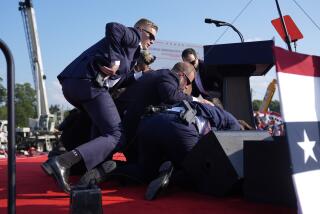Secrets Kept, Secrets Spilled
- Share via
Deep Throat
Still a mystery after 30 years. The identity of the Washington Post’s Watergate informant remains “the best kept secret in the history of the nation’s capital,” says John Dean, the White House counsel whose Senate testimony helped unseat President Nixon. Benjamin C. Bradlee, former Post executive editor, said he learned the man’s name only after Nixon resigned; before that, he said, reporter Bob Woodward told him only about Deep Throat’s job in the executive branch, his experience and his access. The world might learn Deep Throat’s identity after he dies.
National Security Agency
The NSA, once nicknamed No Such Agency, stayed a closely held secret for about a decade, says James Bamford, who wrote two books about the eavesdroppers. In 1960, two agents defected to Moscow and talked about it at a Red Square news conference. “That sort of blew it,” Bamford said. Even then, the government was not up front about the snoops who uncovered Soviet secrets during the Cuban missile crisis and used Berber linguists to link Libyan agents to the 1986 bombing of a German discotheque that killed a U.S. soldier.
Greenbrier
In 1958, President Eisenhower authorized construction of an elaborate hideaway for 1,100 officials, including members of Congress, under the Greenbrier Resort in White Sulfur Springs, W.Va., a four-hour drive from Washington. Resort officials denied knowing what was beneath them. Details came out in the press in 1992 and, with the Cold War over, the government turned control of the facility over to the resort, which now takes customers on tours and rents it out for parties. In 2000, voters defeated a proposal to make the bunker the home of the state’s first casino.
Mount Pony
This bunker near Culpeper, Va., once held several billion dollars stacked close to the ceiling, meant to revive the economy after a nuclear attack. It had an indoor shooting range, lead-lined shutters and a cold-storage area to hold any bodies that could not be buried outdoors because of radiation. Mount Pony’s peacetime purpose was serving as the central node, or “switch,” for the nation’s electronic funds transfers. The Federal Reserve Bank of Richmond sold it in 1998 for use as a Library of Congress film repository. Thus was born a new secret: What contingency plans the Fed has now.
More to Read
Sign up for Essential California
The most important California stories and recommendations in your inbox every morning.
You may occasionally receive promotional content from the Los Angeles Times.













